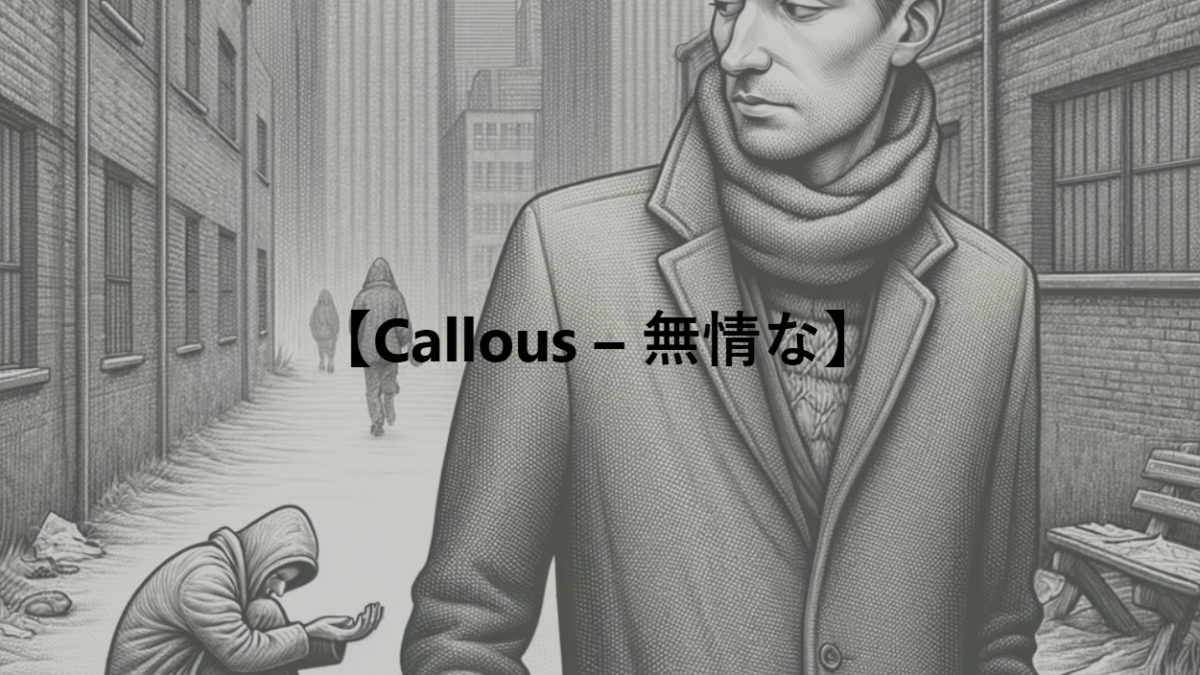語源・類義語・反対語・例文
【Callous – 無情な】という単語の語源とか由来を知っていますか?
「Callous」という単語は、ラテン語の「callum」に由来しています。この言葉はもともと「硬い皮膚」や「たこ」を意味していました。時間が経つにつれて、この単語は比喩的な意味を帯びるようになり、感情的に鈍感な、または他人の感情に対して無関心または無情な態度を表すために使われるようになりました。英語で「callous」という形容詞は、人が他人の苦しみに対して感じる共感の欠如や、感情的な冷淡さを表すのに用いられます。
The word “callous” originates from the Latin “callum,” which originally meant “hard skin” or “callus.” Over time, this term has acquired a metaphorical meaning and is now used to describe an attitude that is emotionally insensitive or indifferent, particularly towards others’ suffering. In English, the adjective “callous” is used to denote a lack of empathy or emotional coldness towards someone else’s pain.
この単語の類義語・反対語を教えてください。
類義語
- Insensitive: 感受性がない、無神経な。
- Heartless: 無情な、冷酷な。
- Unfeeling: 無感情な、無情な。
- Indifferent: 無関心な。
- Cold-hearted: 冷たい心を持った。
- Unsympathetic: 同情しない、共感しない。
- Hard-hearted: 非情な、無慈悲な。
反対語
- Compassionate: 思いやりのある。
- Caring: 配慮深い、面倒を見る。
- Sensitive: 敏感な、感受性が高い。
- Sympathetic: 同情的な、共感的な。
- Warm-hearted: 温かい心を持った。
- Empathetic: 共感的な。
- Kind-hearted: 優しい心を持った。
この単語に似た単語で間違いやすい単語はありますか?
- Callus: 「たこ、魚の目」。これは皮膚が硬くなった部分を指します。「Callous」とは発音が似ていますが、完全に異なる意味を持ちます。
- Callow: 「未熟な、若葉の」。経験や成熟度が不足している状態を指します。「Callous」とは発音が似ていますが、意味は全く異なります。
- Calloway: これは人の名前やブランド名などで使われる単語で、特に「Callous」とは関係がありませんが、発音が似ているために混同されることがあります。
- Callose: 植物学の用語で、植物の組織内に形成される物質を指します。専門的な用語で、「Callous」とは全く異なる意味ですが、音が似ています。
この単語を使った例文を5つほど教えてください。
Despite knowing about the plight of the homeless, he remained callous and refused to offer any assistance.
(ホームレスの苦境を知りながらも、彼は無情であり、いかなる援助も提供しませんでした。)
The callous remarks she made wounded the feelings of those around her.
(彼女が述べた無情な発言は、周囲の人々の感情を傷つけました。)
The manager’s callous treatment of the employees created a hostile work environment.
(マネージャーの無情な扱いにより、敵対的な職場環境が生まれました。)
He showed a callous disregard for the suffering of others, only concerned with his own interests.
(彼は他人の苦しみを無視し、自分の利益にしか関心を持ちませんでした。)
The callous attitude of the dictator towards human rights violations sparked international outrage.
(独裁者の無情な態度は、人権侵害に対する国際的な激怒を引き起こしました。)
【Callous – 無情な】のコロケーション
- Callous attitude: 「無情な態度」。他人の感情や状況に対して感受性がなく、無関心な態度を表します。
- Callous disregard: 「無情な無視」。他人の権利や感情を完全に無視する冷淡な行動や態度を指します。
- Callous response: 「無情な反応」。他人の痛みや困難に対して、感情的な共感を欠いた冷たい反応を示します。
- Callous treatment: 「無情な扱い」。人に対して非人道的または冷酷な方法で行動することを指します。
- Callous words: 「無情な言葉」。他人を傷つける可能性がある、冷たく感情を考慮しない言葉遣いを表します。
「Callous」という単語は、「無情な」や「感情に鈍感な」という意味を持ち、他人の苦しみや感情に対して冷たい態度を取ることを表します。この言葉は様々な文脈で使われるため、以下にいくつかの一般的なコロケーションを示します。
まず、”Callous attitude”、これは「無情な態度」を意味します。他人の感情や状況に対して冷淡で無関心な姿勢を指し、共感の欠如を示します。
次に、”Callous disregard”、これは「無情な無視」を表します。ここで言う「無視」は、他人の権利や感情を完全に軽視することを意味し、深刻な冷酷さを示します。
また、”Callous response”とは、「無情な反応」を指します。これは、他人の苦痛や問題に対して、感情的な共感を示さない反応を意味します。
“Callous treatment”は「無情な扱い」を意味し、人を冷酷に扱う行為、特に倫理的に問題のある行動を指します。
最後に、”Callous words”とは、「無情な言葉」を表します。これは、他人の感情を傷つけたり、無視したりするような言葉遣いを指し、言葉の選択における冷たさや非情さを示しています。
The word “callous” means “heartless” or “insensitive to emotions” and represents an attitude of coldness towards others’ suffering or feelings. This term is used in various contexts, so below are some common collocations.
Firstly, “Callous attitude” refers to a “heartless attitude.” It points to an apathetic and indifferent posture towards others’ emotions and situations, indicating a lack of empathy.
Next, “Callous disregard” denotes “heartless disregard.” Here, ‘disregard’ means completely neglecting the rights or feelings of others, showing serious cruelty.
Furthermore, “Callous response” means a “heartless response.” It refers to a reaction that lacks emotional empathy towards others’ pain or problems.
“Callous treatment” signifies “heartless treatment.” This refers to actions of treating someone cruelly, especially behavior that is ethically problematic.
Lastly, “Callous words” represent “heartless words.” This points to a way of speaking that hurts or ignores others’ feelings, demonstrating coldness or heartlessness in the choice of words.
callousを使った文法問題
- The manager’s _____ disregard for the employees’ concerns led to a widespread dissatisfaction in the workplace.
- (A) callously
- (B) callousness
- (C) callous
- (D) calloused
解答と解説: (C) callous
解説: 空欄には名詞 disregard を修飾する形容詞が入ります。callous は「無情な、冷淡な」という意味の形容詞です。
- The dictator’s _____ treatment of his people resulted in widespread suffering and poverty.
- (A) callously
- (B) callousness
- (C) callous
- (D) calloused
解答と解説: (C) callous
解説: 空欄には名詞 treatment を修飾する形容詞が入ります。callous は「無情な、冷淡な」という意味の形容詞です。
- The journalist’s _____ remarks about the tragedy drew widespread condemnation.
- (A) callously
- (B) callousness
- (C) callous
- (D) calloused
解答と解説: (C) callous
解説: 空欄には名詞 remarks を修飾する形容詞が入ります。callous は「無神経な、思いやりのない」という意味の形容詞です。
- The company’s _____ decision to lay off hundreds of workers without warning sparked outrage among the public.
- (A) callously
- (B) callousness
- (C) callous
- (D) calloused
解答と解説: (C) callous
解説: 空欄には名詞 decision を修飾する形容詞が入ります。callous は「無情な、冷淡な」という意味の形容詞です。
- The _____ indifference of the bystanders to the victim’s plight was shocking.
- (A) callously
- (B) callousness
- (C) callous
- (D) calloused
解答と解説: (C) callous
解説: 空欄には名詞 indifference を修飾する形容詞が入ります。callous は「無情な、冷淡な」という意味の形容詞です。

